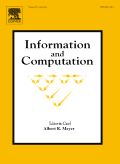
INFORMATION AND COMPUTATION
Scope & Guideline
Exploring the Synergy of Information and Computation
Introduction
Aims and Scopes
- Computational Complexity:
The journal frequently publishes research on computational complexity, exploring the resources required for solving problems and classifying problems based on their inherent difficulty. - Formal Languages and Automata Theory:
A significant portion of the journal's content involves the study of formal languages, automata, and their applications in computer science, including algorithms for language recognition and transformation. - Algorithm Design and Analysis:
Research on novel algorithms, particularly those addressing optimization and decision-making problems, is a key focus area, reflecting the journal's commitment to advancing computational methods. - Cryptography and Security:
The journal includes studies on cryptographic protocols and security measures, emphasizing advancements in securing information systems against various threats. - Hybrid and Quantum Systems:
Emerging areas such as hybrid systems and quantum computing are also represented, showcasing the journal's dedication to contemporary computational paradigms. - Neural and Machine Learning Models:
Research on neural networks and machine learning frameworks, particularly their theoretical underpinnings and computational efficiency, is increasingly prominent. - Temporal Logic and Verification:
Studies involving temporal logic, model checking, and verification of systems are central to the journal's mission, providing insights into system reliability and correctness.
Trending and Emerging
- Neural-Symbolic Computation:
The integration of neural network methodologies with symbolic reasoning is gaining traction, indicating a trend towards hybrid models that leverage both data-driven and rule-based approaches. - Quantum Computing and Information Theory:
Research focusing on quantum algorithms and their applications in information theory is on the rise, reflecting the growing interest in harnessing quantum mechanics for computational advantages. - Complexity in Game Theory:
Emerging themes in game theory, particularly regarding complexity and strategic interactions in computational settings, are increasingly prominent, suggesting a convergence of theoretical and applied research. - Dynamic and Temporal Systems:
There is a noticeable increase in studies related to dynamic systems and temporal logics, emphasizing the need for robust verification methods in systems that evolve over time. - Interdisciplinary Approaches to Information Science:
An upward trend in interdisciplinary research that combines insights from computer science, mathematics, and cognitive science is evident, showcasing the journal's role in facilitating cross-disciplinary dialogue. - Privacy-Preserving Computation:
Research dedicated to privacy-preserving algorithms and mechanisms is becoming more significant, driven by the growing importance of security and data privacy in computational applications.
Declining or Waning
- Classical Automata Theory:
Although still relevant, traditional topics in automata theory have seen a decrease in focus, possibly due to the rise of more complex models that integrate additional computational aspects. - Basic Graph Theory Applications:
Research centered on foundational graph theory applications has become less prominent as newer, more advanced topics gain traction in computational discussions. - Static Analysis Techniques:
The frequency of papers focusing solely on static analysis methods has waned, as the field shifts towards more dynamic and adaptable approaches to software verification and analysis. - Deterministic Algorithms:
The emphasis on purely deterministic algorithms has diminished, with a growing preference for probabilistic and approximation algorithms that address real-world complexities.
Similar Journals
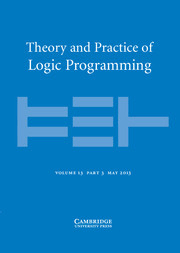
THEORY AND PRACTICE OF LOGIC PROGRAMMING
Elevating Research Standards in Logic Programming.THEORY AND PRACTICE OF LOGIC PROGRAMMING, published by Cambridge University Press, is a premier academic journal that delves into the evolving field of logic programming, offering insights and advancements from 2001 to 2024. With an ISSN of 1471-0684 and an E-ISSN of 1475-3081, this journal serves as a vital resource for researchers, professionals, and students interested in areas such as artificial intelligence, computational theory, and software development. In 2023, the journal was recognized for its excellence, achieving Q1 status in Computational Theory and Mathematics and Q2 in several other categories, underscoring its significant impact within the academic community. Despite not being open access, its robust content, curated by esteemed scholars, guarantees high-quality research and innovative methodologies that are crucial for advancing the field. The journal's rigorous peer-review process and its standings in Scopus rankings further emphasize its relevance and authority, making it a quintessential platform for disseminating key findings and fostering scholarly dialogue.

FUNDAMENTA INFORMATICAE
Advancing the Frontiers of Informatics and Mathematics.FUNDAMENTA INFORMATICAE is a distinguished academic journal published by IOS PRESS, focusing on the critical intersection of informatics, mathematics, and computer science. Since its inception in 1988, this journal has served as a vital resource for researchers and professionals alike, providing a platform for innovative studies in Algebra and Number Theory, Computational Theory and Mathematics, Information Systems, and Theoretical Computer Science. With an impressive HIndex, and ranking in the Q3 and Q4 categories across various disciplines as of 2023, it underscores its contribution and relevance in advancing the body of knowledge in these fields. The journal's commitment to excellence is reflected not only in its rigorous peer-review process but also in its notable rankings on Scopus, which positions it favorably among its peers. Though not yet available as an open access journal, FUNDAMENTA INFORMATICAE remains a crucial academic venue for authors wishing to disseminate their findings to a global audience, promoting collaboration and further research within the scientific community.
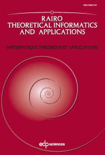
RAIRO-THEORETICAL INFORMATICS AND APPLICATIONS
Illuminating Pathways in Theoretical Informatics.RAIRO - Theoretical Informatics and Applications is a renowned academic journal published by EDP Sciences S A that has been at the forefront of disseminating innovative research and applications in the fields of computer science and mathematics since its inception in 1995. With a focus on theoretical and applied aspects of informatics, the journal serves as a vital resource for researchers and professionals seeking to explore the intricacies of computational theories and their practical applications. Although currently lacking an Open Access model, it provides invaluable insights from distinguished researchers within its Q4 category rankings across its pertinent fields. As reflected in its Scopus rankings, including a position in the 24th percentile for General Mathematics and the 9th percentile for Computer Science Applications, RAIRO is pivotal in contributing to the ongoing discourse and advancements in theoretical informatics. Researchers, professionals, and students will find this journal critical in understanding emerging trends and challenges in the rapidly evolving domains of computer science and mathematics.
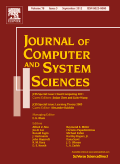
JOURNAL OF COMPUTER AND SYSTEM SCIENCES
Pioneering insights in computer science and systems analysis.The Journal of Computer and System Sciences is a distinguished publication founded in 1967 and continually striving to push the boundaries of knowledge in computer science and applied mathematics. Published by Academic Press Inc, Elsevier Science, this journal boasts impressive credentials, holding a Q1 quartile ranking across multiple categories including Applied Mathematics, Computational Theory and Mathematics, Computer Networks and Communications, and Theoretical Computer Science as of 2023. With a focus on innovative research and comprehensive theoretical developments, this journal serves as a pivotal forum for authors and readers alike, facilitating cutting-edge contributions to the field. The journal is not currently open access, providing a curated selection of high-quality articles for its subscription residents. By engaging with this journal, researchers, professionals, and students can gain insight into the latest trends, prominent methodologies, and significant findings that shape the modern landscape of computing and systems analysis.

Logical Methods in Computer Science
Connecting scholars to the future of computer science.Logical Methods in Computer Science is a premier Open Access journal dedicated to fostering scholarly dialogue within the realms of Computer Science and Theoretical Computer Science. Established in 2004 and published by LOGICAL METHODS COMPUTER SCIENCE E V in Germany, this journal aims to bridge theoretical frameworks and practical applications, providing a platform for innovative research and discoveries. With an impressive HIndex reflecting its commitment to high-quality research, Logical Methods in Computer Science has achieved a Q2 ranking in both the miscellaneous and theoretical categories of computer science, indicating its growing influence in the academic community. Researchers, professionals, and students are encouraged to access and engage with the wealth of knowledge this journal offers, which is freely accessible to facilitate widespread dissemination of cutting-edge advancements in logical methods. With its convergence period extending from 2005 to 2024, Logical Methods in Computer Science continues to be a vital resource for those looking to explore the intersections of logic, computation, and mathematics.
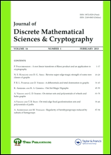
JOURNAL OF DISCRETE MATHEMATICAL SCIENCES & CRYPTOGRAPHY
Exploring the Frontiers of Mathematical SciencesThe Journal of Discrete Mathematical Sciences & Cryptography, published by Taru Publications, serves as a pivotal platform for researchers, professionals, and students in the fields of discrete mathematics and cryptography. Since its inception in 1998, the journal has consistently provided high-quality research articles, reviews, and case studies that span essential areas such as Algebra, Number Theory, and Applied Mathematics, achieving a Q3 category ranking in these disciplines as of 2023. With impressive Scopus rankings, including Rank #7 in Algebra and Number Theory and a notable 94th percentile status, this journal underscores its significance within the academic community. Although not an open access journal, it remains a crucial reference point for advancements in mathematical sciences, fostering scholarly dialogue and collaboration. As the field evolves, it continues to bridge theoretical frameworks and practical implementations, contributing substantially to the educational and professional landscape.

QUANTUM INFORMATION & COMPUTATION
Bridging Theory and Application in Quantum ScienceQUANTUM INFORMATION & COMPUTATION is a leading academic journal dedicated to the rapidly evolving fields of quantum information theory and quantum computing. Published by RINTON PRESS, INC, this journal serves as a pivotal platform for disseminating groundbreaking research, advancements, and theoretical insights in various domains including computational theory, mathematical physics, and high-energy physics. With its ISSN 1533-7146, the journal has established a solid reputation since its inception in 2001 and continues to engage researchers up to 2024. Despite its current standing in Q4 and Q3 quartiles across various categories, QUANTUM INFORMATION & COMPUTATION provides valuable contributions by fostering discussions on interdisciplinary applications and theories that challenge conventional paradigms. While the journal does not offer open access, it still supports a wide range of research topics, providing a vital resource for academics, professionals, and students keen on exploring the complex interplay between quantum mechanics and computation. By focusing on innovative techniques and theoretical developments, this journal is essential for anyone aiming to be at the forefront of the quantum revolution.

Advances in Mathematics of Communications
Bridging Theory and Application in MathematicsAdvances in Mathematics of Communications, published by the American Institute of Mathematical Sciences (AIMS), is a leading journal dedicated to the dissemination of high-quality research in the fields of algebra, number theory, applied mathematics, discrete mathematics, combinatorics, and computer networks. Established in 2008, this journal has quickly established itself as a significant contributor to mathematical communications, holding a reputable position in the Scopus rankings, with impressive category quartiles, including Q2 rankings in key areas such as Algebra and Number Theory and Applied Mathematics. Besides its rigorous peer-review process, the journal facilitates the growth of innovative ideas and methodologies that bridge the gap between theory and application. With no open access restrictions, Advances in Mathematics of Communications aims to provide an inclusive platform for researchers, professionals, and students to share their findings and insights, fostering collaboration and advancing the global knowledge base in the mathematical sciences. The journal's commitment to excellence ensures its role as an essential resource in the ever-evolving landscape of mathematics.

FORMAL ASPECTS OF COMPUTING
Shaping the Future of Software Engineering through Rigorous ResearchFORMAL ASPECTS OF COMPUTING is a distinguished journal published by the ASSOCIATION FOR COMPUTING MACHINERY, dedicated to the fields of Software Engineering and Theoretical Computer Science. With the ISSN 0934-5043 and E-ISSN 1433-299X, this journal has made a significant impact in its categories, achieving a Q3 ranking in both Software and Theoretical Computer Science as of 2023. The journal spans over three decades since its inception in 1989, providing a platform for high-quality research that addresses critical formal methods and their applications in computing. While it currently does not offer open access, it remains an essential resource for researchers and practitioners in the field. The journal's credibility is bolstered by its Scopus rankings, placing it in the top half of both theoretical and software-related fields. By engaging with current trends and fostering innovative approaches, FORMAL ASPECTS OF COMPUTING stands as a vital repository of knowledge and a catalyst for future advancements in the discipline.

ACTA INFORMATICA
Exploring the Frontiers of Information Systems.ACTA INFORMATICA is a prestigious academic journal published by Springer, dedicated to advancing the fields of computer networks and communications, information systems, and software engineering. With an ISSN of 0001-5903 and an E-ISSN of 1432-0525, the journal has continued to thrive since its inception in 1971 and is set to cover research up until 2024. Although it currently operates within a Q3 category in its respective fields, it is recognized for providing a platform for high-quality, peer-reviewed research, which is essential for fostering innovation and knowledge dissemination in computer science. While it does not offer an open access option, scholars benefit from its rigorous editorial standards and comprehensive coverage of significant trends and methodologies. The journal is conveniently based in New York, NY, USA, further enhancing its accessibility to a global audience. Researchers, professionals, and students alike will find ACTA INFORMATICA a valuable resource for staying abreast of the latest developments and breakthroughs in this vital area of study.